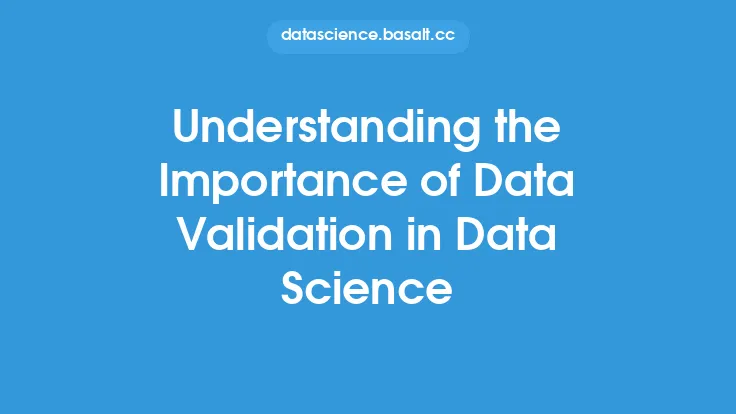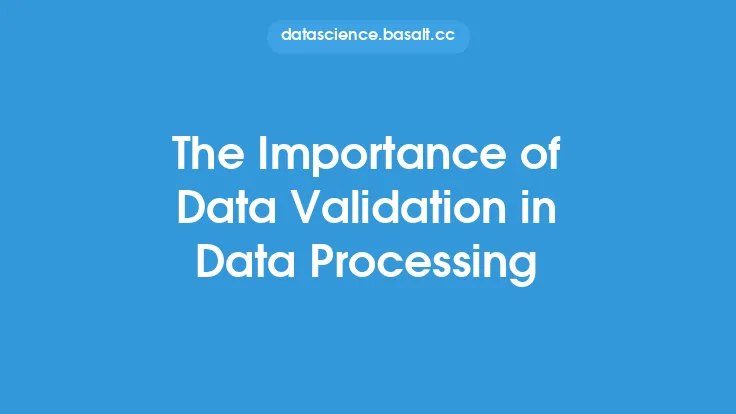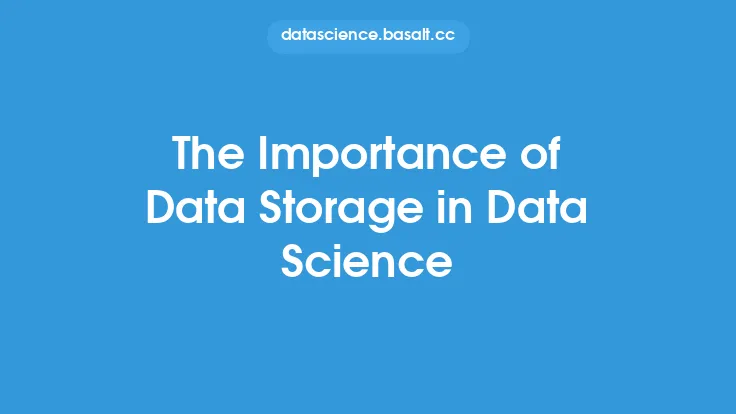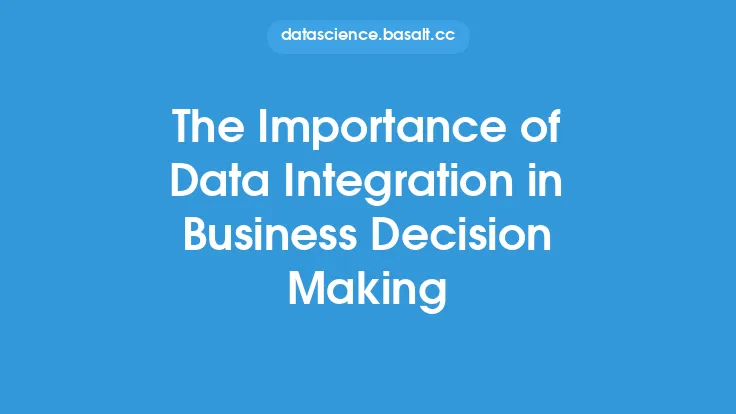Data ingestion is a critical process in the data engineering pipeline, as it enables organizations to collect, transform, and load data from various sources into a centralized repository for analysis and decision-making. However, the quality of the data being ingested is just as important as the process itself. This is where data validation comes into play, ensuring that the data being ingested is accurate, complete, and consistent. In this article, we will delve into the importance of data validation in data ingestion, exploring its benefits, techniques, and best practices.
What is Data Validation?
Data validation is the process of verifying the accuracy, completeness, and consistency of data being ingested into a system. It involves checking the data against a set of predefined rules, constraints, and formats to ensure that it meets the required standards. Data validation can be performed at various stages of the data ingestion process, including during data collection, transformation, and loading. The goal of data validation is to detect and prevent errors, inconsistencies, and inaccuracies in the data, which can have significant consequences on downstream analytics, reporting, and decision-making.
Benefits of Data Validation
Data validation offers numerous benefits, including improved data quality, reduced errors, and increased confidence in the data. By validating data during ingestion, organizations can:
- Ensure data accuracy and completeness, reducing the risk of errors and inconsistencies
- Prevent data corruption and loss, which can occur during data transfer or storage
- Improve data consistency, ensuring that data is formatted and structured correctly
- Enhance data security, by detecting and preventing malicious or unauthorized data
- Reduce the risk of data breaches, by identifying and addressing potential vulnerabilities
- Improve data analytics and reporting, by providing high-quality data for analysis and decision-making
Techniques for Data Validation
There are several techniques for data validation, including:
- Rule-based validation: This involves defining a set of rules and constraints that the data must adhere to. For example, checking that a date field is in the correct format or that a numeric field is within a specified range.
- Format-based validation: This involves checking the format of the data, such as ensuring that a phone number is in the correct format or that an email address is valid.
- Range-based validation: This involves checking that a value is within a specified range, such as ensuring that a temperature reading is within a valid range.
- Cross-field validation: This involves checking the relationships between different fields, such as ensuring that a start date is before an end date.
- Data profiling: This involves analyzing the data to identify patterns, trends, and anomalies, which can help to identify potential errors or inconsistencies.
Best Practices for Data Validation
To ensure effective data validation, organizations should follow best practices, including:
- Define clear validation rules: Establish clear and concise validation rules that are based on business requirements and data quality standards.
- Use automated validation tools: Leverage automated validation tools and technologies, such as data quality software and data validation frameworks, to streamline the validation process.
- Validate data in real-time: Validate data in real-time, as it is being ingested, to detect and prevent errors and inconsistencies.
- Monitor and report validation results: Monitor and report validation results, to identify trends and patterns, and to improve the validation process.
- Continuously review and update validation rules: Continuously review and update validation rules, to ensure that they remain relevant and effective.
Data Validation in Data Ingestion Pipelines
Data validation is a critical component of data ingestion pipelines, as it ensures that high-quality data is being ingested into the system. Data ingestion pipelines typically involve several stages, including data collection, transformation, and loading. Data validation can be performed at each stage, to ensure that the data is accurate, complete, and consistent. For example:
- Data collection: Validate data during collection, to ensure that it is accurate and complete.
- Data transformation: Validate data during transformation, to ensure that it is correctly formatted and structured.
- Data loading: Validate data during loading, to ensure that it is correctly loaded into the target system.
Tools and Technologies for Data Validation
There are several tools and technologies available for data validation, including:
- Data quality software: Software such as Trifacta, Talend, and Informatica, which provide data quality and validation capabilities.
- Data validation frameworks: Frameworks such as Apache Beam, Apache Spark, and Python, which provide data validation and quality capabilities.
- Data ingestion tools: Tools such as Apache NiFi, Apache Kafka, and AWS Kinesis, which provide data ingestion and validation capabilities.
Conclusion
Data validation is a critical component of data ingestion, ensuring that high-quality data is being ingested into the system. By understanding the importance of data validation, techniques for data validation, and best practices for data validation, organizations can improve the quality of their data, reduce errors, and increase confidence in their data. By leveraging tools and technologies for data validation, organizations can streamline the validation process, and ensure that their data is accurate, complete, and consistent.





